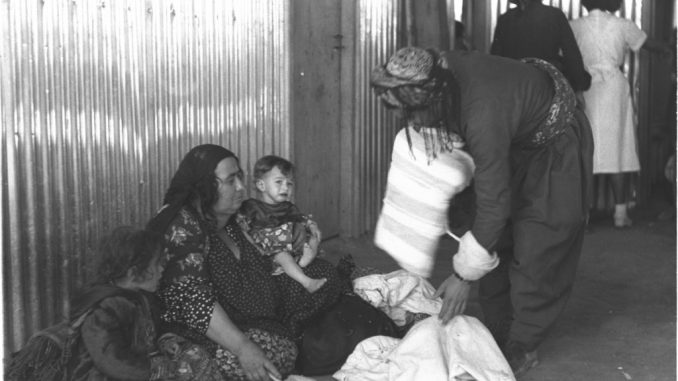
It is not true that the Israeli government had no policy concerning compensation for Jewish Refugees from Arab countries – just that so many political initiatives never got off the ground or met with international indifference, as in the case of Jewish refugees from the Suez crisis, finds Eylon Aslan-Levy in The Tower magazine. This is the first instalment of his Cambridge thesis on the oft forgotten subject of the Forgotten Refugees.
The mass exodus of Jewish refugees from the Arab world remains one of the great untold stories of the 20th century. Indeed, it has been so overshadowed by the flight of Palestinian Arab refugees that even devoted commentators remain ignorant of one momentous chapter in this story: The early attempts by the State of Israel to use the exodus to gain diplomatic leverage over the Arab states. Contrary to popular belief, Israel did not ignore the exodus. It tried to incorporate it into its foreign policy in order to neutralize pressure brought to bear on the issue of the Arab refugees.
For my master’s thesis at the University of Cambridge, I explored the unexamined history of this policy. Delving into Israel’s state archives, I connected the dots between previously unpublished documents and brief references in history books, discovering how Israel addressed the absorption of hundreds of thousands of refugees from belligerent powers. This is the forgotten history of a forgotten exodus.
Israel announced its official foreign policy on the exodus one week after a dramatic decision by Iraq to disenfranchise and expropriate the assets of Jews fleeing the country. In March 1950, Iraq’s Denaturalization Law permitted Jews to emigrate within one year on condition of surrendering their citizenship. Prime Minister Tawfiq al-Suweidi expected no more than 7,000 Jews to leave, but over 100,000 chose to do so. In March 1951, returning Prime Minister Nuri as-Said passed legislation freezing the assets of every denaturalized Jew. Overnight, with Israel unable to keep up with the flood of immigrants, there were 70,000 stateless and penniless Jews stranded in Iraq.
One week later, Israeli Foreign Minister Moshe Sharett addressed the Knesset. The government of Iraq, he argued, had “opened an account between it and the government of Israel,” and forced the Jewish state to link this account to one that already existed: The Arab refugees from Israel’s War of Independence. “We shall take into account the value of the Jewish property that has been frozen in Iraq,” declared Sharett, “when calculating the compensation that we have undertaken to pay the Arabs who abandoned property in Israel.”
This principle has been a centerpiece of Israeli policy ever since. Israel effectively nationalized the property of Jewish refugees from the Arab world, claiming an exclusive right to use their private property to write off future compensation payments to the Arabs. Indeed, this point was made explicit in a Foreign Ministry meeting the following week on establishing an agency to register the Iraqi Jews’ claims. “We advise not to announce at least for the meanwhile,” the officials stated, “that personal claims are being registered with the purpose of deducting the value…from the payment of the compensation for the abandoned Arab property.”
The Sharett Doctrine was not developed on the fly. In August 1948, Israel had told UN mediator Folke Bernadotte that any peace treaty with the Arab states should pay “due regard to Jewish counterclaims” for “havoc and destruction.” Once the exodus was underway, this demand for counterclaims was merged with the refugee issue: In July 1948, Sharett cabled diplomats that the question of the confiscation of Jewish property would be raised in any peace settlement dealing with the question of Arab refugees. (…)
srael was keen for Egyptian Jews to depart with their assets, because the cost of absorbing yet more penniless refugees was placing an enormous strain on national finances. The Jews had been allowed to leave Egypt with travelers’ checks of £100 and those who reached Israel could only withdraw £20 because Britain refused to allow the checks to be cashed outside of the sterling zones or by non-nationals. The Foreign Ministry was forced to intervene when the Bank of England refused the Israeli Bank Leumi’s request to allow the withdrawal of £40,000 of accumulated checks.
What followed illustrates the sheer obstinacy of the great powers’ refusal to assist Israel with its refugee burden. The UK Treasury informed the Israeli embassy that Britain was “unable” to revise its decision, since it had never made an exception for non-Jews “of several nationalities residing outside the sterling area.” The embassy retorted that most non-British refugees were in Israel, so this point was “more academic…than practical”: Would the UK reconsider in light of the “humanitarian” dimension? The Treasury replied that it would not release cash outside of a “general settlement,” and unhelpfully replied that Egypt might meet the uncashed balance from its own sterling account “if her own authorities can be persuaded.” Britain, the official said with characteristic passive-aggressiveness, would not object.
At its wits’ end, the Israeli Foreign Ministry persuaded the UN High Commissioner for Human Rights to intercede. The British Foreign Secretary did not respond favorably. Britain and France later reached separate agreements with Egypt for compensation for their own nationals, also expelled during the Suez crisis, leaving the nationless Jews by the wayside. When Israel signed its own peace treaty with Egypt in 1979, the treaty only made provisions for a claims commission. It has yet to be convened.
It is common to say that Jewish refugees from Arab lands have been “forgotten,” as if the political significance of a massive influx of refugees from enemy states never dawned on Israel. But once one delves into the history, one discovers that the issue was very much on the minds of Israeli policymakers. Israel understood that it had a card with which to try to neutralize a major threat—the demands of the Arab refugees, which were artificially kept on a low flame by Arab governments opposed to their resettlement.
But this card was never successfully played: Israel found that neither the regional political situation nor international opinion were sympathetic to its arguments. What was forgotten was not the diplomatic potential of the refugee issue itself, but the fact that Israel was aware of that potential, and frustrated at every attempt to make use of it.
In Israel, there is now much discussion of the idea of a regional peace settlement with the Arab world. It is an open question whether the issue of the Jewish exodus from Arab lands will be part of this discussion. If so, it would not be the first time that Israel contemplated leveraging this issue on the international agenda. Contrary to popular myth, Israel has indeed tried to get justice for its own refugees, and may well do so again.


Leave a Reply